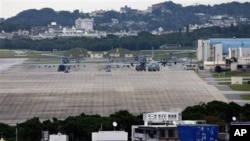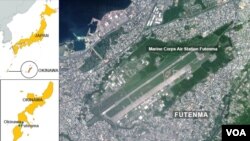WASHINGTON —
U.S. officials are calling an agreement to move a U.S. military base on the Japanese island of Okinawa a breakthrough. Regional analysts say the Okinawa governor's decision on the deal may have been influenced by China's recent moves in the region. Still, many Okinawans remain fiercely opposed to the idea.
Okinawa Governor Hirokazu Nakaima Friday approved the Japanese Defense Ministry's application to reclaim land for a proposed U.S. base on the Henoko coast. It would replace the existing Marine Corps Futenma base in the crowded city of Ginowan, and it would be part of a realignment of U.S. troops in the Asia-Pacific region.
China's increased presence in the region was a factor in the deal, said Denny Roy, a senior fellow at the East-West Center in Honolulu.
"The sense of threat from China in Japan has palpably increased with the raising of tensions around the Senkaku / Diaoyutai Islands because the Japanese see this as an actual Chinese attempt to take what the Japanese feel is Japanese territory. So a more direct threat than they've ever seen in the postwar period."
Sheila Smith, a senior fellow at the Council on Foreign Relations, said conflict with China is felt very strongly on Okinawa.
"Those islands are located in Okinawa Prefecture, the same place as our military bases, and so this brings home, I think, to many, not only in the main islands of Japan, but to some in Okinawa as well, that this is a new era in Northeast Asia, and the strategic challenges for Japan are different than they were 17 years ago," said Smith.
The tiny, unoccupied islands are under Japanese administration, but China claims them. China recently imposed an air defense zone around the islands, causing new fears and strains in Japan.
Despite those fears, many Okinawans want Futenma base closed entirely, and the U.S. military presence sharply reduced.
Japanese Prime Minister Shinzo Abe pledged increased financial assistance to Okinawa in exchange for the new base.
Smith said Abe sought to limit the governor's political liability in the deal, in the face of intense opposition. "You have a very willing negotiator on the part of Prime Minister Abe. You have a governor who sought to find as much relief for his residents as possible. And you found, finally, the right place for the compromise to happen."
She said that protests, however, could threaten the project. "It's very hard to know, at this stage, how widespread they will be, whether or not they will be sustainable over time and whether they will get in the way of construction."
U.S. Defense Secretary Chuck Hagel called the deal "absolutely critical to the United States' ongoing rebalance to the Asia-Pacific region."
Roy said the agreement has pushed forward both Washington's "Asia pivot" and U.S.-Japanese relations.
"It's a noteworthy breakthrough. It doesn't seal the deal in either direction, but it provides at least a hope of some progress on this issue, which has really bedeviled U.S.-Japan relations for almost 20 years now," he said.
Completion of the new air station could take about a decade. As part of the realignment, the Pentagon expects to reduce the number of Marines stationed on Okinawa from 18,000 to about 10,000. Some of the Marines will be moved to Australia, the U.S. state of Hawaii and the U.S. territory of Guam.
Okinawa Governor Hirokazu Nakaima Friday approved the Japanese Defense Ministry's application to reclaim land for a proposed U.S. base on the Henoko coast. It would replace the existing Marine Corps Futenma base in the crowded city of Ginowan, and it would be part of a realignment of U.S. troops in the Asia-Pacific region.
China's increased presence in the region was a factor in the deal, said Denny Roy, a senior fellow at the East-West Center in Honolulu.
"The sense of threat from China in Japan has palpably increased with the raising of tensions around the Senkaku / Diaoyutai Islands because the Japanese see this as an actual Chinese attempt to take what the Japanese feel is Japanese territory. So a more direct threat than they've ever seen in the postwar period."
Sheila Smith, a senior fellow at the Council on Foreign Relations, said conflict with China is felt very strongly on Okinawa.
"Those islands are located in Okinawa Prefecture, the same place as our military bases, and so this brings home, I think, to many, not only in the main islands of Japan, but to some in Okinawa as well, that this is a new era in Northeast Asia, and the strategic challenges for Japan are different than they were 17 years ago," said Smith.
The tiny, unoccupied islands are under Japanese administration, but China claims them. China recently imposed an air defense zone around the islands, causing new fears and strains in Japan.
Despite those fears, many Okinawans want Futenma base closed entirely, and the U.S. military presence sharply reduced.
Japanese Prime Minister Shinzo Abe pledged increased financial assistance to Okinawa in exchange for the new base.
Smith said Abe sought to limit the governor's political liability in the deal, in the face of intense opposition. "You have a very willing negotiator on the part of Prime Minister Abe. You have a governor who sought to find as much relief for his residents as possible. And you found, finally, the right place for the compromise to happen."
She said that protests, however, could threaten the project. "It's very hard to know, at this stage, how widespread they will be, whether or not they will be sustainable over time and whether they will get in the way of construction."
U.S. Defense Secretary Chuck Hagel called the deal "absolutely critical to the United States' ongoing rebalance to the Asia-Pacific region."
Roy said the agreement has pushed forward both Washington's "Asia pivot" and U.S.-Japanese relations.
"It's a noteworthy breakthrough. It doesn't seal the deal in either direction, but it provides at least a hope of some progress on this issue, which has really bedeviled U.S.-Japan relations for almost 20 years now," he said.
Completion of the new air station could take about a decade. As part of the realignment, the Pentagon expects to reduce the number of Marines stationed on Okinawa from 18,000 to about 10,000. Some of the Marines will be moved to Australia, the U.S. state of Hawaii and the U.S. territory of Guam.

